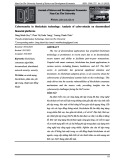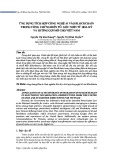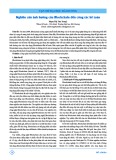
P-ISSN 1859-3585 E-ISSN 2615-9619 https://jst-haui.vn ECONOMICS - SOCIETY Vol. 60 - No. 11E (Nov 2024) HaUI Journal of Science and Technology
179
EFFECT OF BLOCKCHAIN ON VIETNAMESE COMMERCIAL BANK PERFORMANCE: MEDIATING ROLE OF ACCOUNTING INFORMATION SYSTEM QUALITY
Tang My Sang1,* DOI: http://doi.org/10.57001/huih5804.2024.356 ABSTRACT
This study aims to understand the effect of blockchain on bank
performance of banks under the mediating role of accounting information
systems quality. Based on the Resource-
based perspective, the proposed
research model with 4 hypotheses and data is surve
yed from 324 employees
working in the nance and accounting departments of Vietnamese
commercial banks. The data is then processed using SmartPLS 4.0 software.
The results show that blockchain has a positive impact on accounting
information systems and ba
nk performance. The results also show the positive
and signicant effect of accounting information systems on bank
performance. The study also proposes some governance implications for banks
in their digitalization strategies. Keywords
: Accounting, bank performance, blockchain, commercial
banking, digitalization, information systems. 1Ho Chi Minh City University of Economics and Finance (UEF), Vietnam *Email: sangtm@uef.edu.vn Received: 09/8/2024 Revised: 25/10/2024 Accepted: 28/11/2024 1. INTRODUCTION In the context of the rapid development of the modern banking industry, the integration of advanced technologies is inevitable. These technologies help improve efficiency, security, and transparency in nancial operations [1]. As the foundation for cryptocurrencies, blockchain technology has emerged as a disruptive innovation. Although it is widely used in developing economies such as Vietnam, the impact of Blockchain on accounting information systems and banking operations still needs to be explored. Previous research has shown Blockchain's ability to innovate nancial services, but studies on the impact of this technology on Vietnamese commercial banks have not yet been determined. Recent studies increasingly show the benets of Blockchain for accounting at banks [2]. In Vietnam, blockchain applications are improved, promoting bank performance, and increasing the security and transparency of nancial activities. Common blockchain applications banks use include cross-border transactions, trade nance, credit reporting, clearing, and customer identity conrmation. The potential of Blockchain to help promote digital transformation in Vietnam, where banks are the main source of capital for the economy, so the requirement to ensure safety and transparency is very important. This study explores the impact of blockchain applications on the quality of accounting information systems, thereby affecting bank performance in Vietnam. The results provide important information for strategic decisions in an environment where the nancial system is constantly changing. This study aims to provide insights for policymakers and nancial institutions in effectively leveraging blockchain technology to improve the quality of accounting information systems and improve the overall bank performance. 2. LITERATURE REVIEW 2.1. Resource-based perspective (RBV) RBV introduced by [3] highlights how a rm's internal resources and capabilities are key to achieving a sustainable competitive advantage. Applying in this research, RBV emphasizes the importance of Blockchain as a valuable, rare, inimitable, and strategically irreplaceable resource, and positions it as a critical asset for organizations [4]. Blockchain integration positively affects the quality of accounting information, improving

ECONOMICS - SOCIETY https://jst-haui.vn HaUI Journal of Science and Technology Vol. 60 - No. 11E (Nov 2024)
180
P
-
ISSN 1859
-
3585
E
-
ISSN 2615
-
961
9
the accuracy, reliability, and comprehension of nancial data [5]. Blockchain's role in reducing information asymmetry, improving stakeholder collaboration and transforming enterprise resource planning systems underscores its potential to reshape the way the accounting industry works. 2.2. The function of blockchain applications in banking sector accounting information systems In recent years, the banking industry has witnessed signicant transformations under the impact of emerging technologies such as cloud computing, cloud data, articial intelligence, and the Internet of Things (IoT) [6]. In particular, blockchain has emerged as a transformative force, strongly impacting the business model of the banking industry [7]. The most prominent feature of blockchain technology is that it is structured as a ledger, which is orderly, decentralized, and immutable, facilitating the recording of transactions within the network. Transactions are securely recorded in immutable blocks, including all relevant information. This decentralized approach is in contrast to traditional methods of recording transactions, which are often centralized, inefficient, and expensive. Blockchain provides an innovative solution that allows for the recording and sharing of valuable transaction information across the network. The integration of blockchain technology into accounting information systems in the banking sector is the focus of recent research because of its distinctive features of security, transparency, and immutability [8]. Blockchain's transformative potential helps accelerate payments and reduce risks associated with nancial reporting fraud [9]. Other outstanding characteristics of Blockchain have been identied such as providing differentiated access, high security, and good fraud prevention. In addition, blockchain technology is also used to record errors in the accounting profession [2]. 2.3. Research hypothesis This study aims to understand the relationship between blockchain application strategies, accounting information system quality, and bank performance. The resource-based perspective emphasizes the importance of resources to an organization's competitive advantage. Applied to this study, the implications of RBV are expressed through the use of blockchain applications that contribute to improving the quality of accounting information systems and then impact the overall performance of the organization. Given the rapid growth of the contemporary banking sector, it is now deemed necessary to integrate cutting-edge technologies, particularly blockchain, to improve transparency, efficiency, and security. Its importance lies in reshaping traditional processes, redening behavior, and recording nancial transactions in accounting information systems in the banking sector. The longevity and resistance to manipulation of Blockchain represents a paradigm shift for accounting as a transaction ledger [10]. Smart contracts are also an application of blockchain in the banking industry. This contract facilitates the execution of legally binding nancial arrangements based on predetermined conditions. In the context of accounting information systems, Blockchain solves long-standing challenges related to the security, efficiency, and authenticity of nancial data, bringing profound impacts [11]. Blockchain applications focus on cost and time advantages, removing intermediaries from the system. Transactions ensure security and certainty in a consensus system, allowing for transparent transactions without the need to reconcile different ledgers. Implementing blockchain technology signicantly saves transaction time and operational costs, contributing to overall resource optimization [12]. Blockchain protects data integrity, facilitates instant information sharing, and provides automated control of processes. It is identied as a technology that can make accounting information more reliable and time-saving compared to traditional accounting and auditing systems. The application of Blockchain with optimal contracts can enhance compliance, risk management, and efficiency. It provides an opportunity to optimize functions, recognize uncertain transactions, and improve internal control. The role of auditors can evolve with Blockchain, leading to changes in the audit process [13]. In conclusion, integrating blockchain technology into accounting information systems is the key to reshaping bank performance. The impact of Blockchain is revolutionary, ranging from enhancing the quality of information to automating compliance, auditing, and changing the role of accounting. The continuous development of technology, especially the adoption of Blockchain, requires a nuanced understanding of the challenges and an emphasis on empirical research to unlock the full potential of these innovations in the eld of commercial banking and accounting. Previous research has shown the positive

P-ISSN 1859-3585 E-ISSN 2615-9619 https://jst-haui.vn ECONOMICS - SOCIETY Vol. 60 - No. 11E (Nov 2024) HaUI Journal of Science and Technology
181
impact of information technology, including blockchain technology, on the quality of accounting information [14]. Which, important factors affecting the quality of accounting information include timeliness, relevance, accuracy, completeness, and actual conversion rate. Qualitative features, including the reliability of nancial statements, are further emphasized through veriability, truthfulness, and neutrality in the information prepared are also conrmed [15]. This technology helps eliminate time differences in the release of nancial statements. Real-time accounting systems allow stakeholders to track payments, providing a more accurate and up-to-date understanding of the nancial situation. Since then, the bank's operational efficiency has also been promoted. The quality of accounting information systems, measured through accuracy, reliability, timeliness, relevance, completeness, and actual conversion rates, acts as an intermediary variable [5]. The quality of accounting information systems plays an important intermediary role in the relationship between the effective use of blockchain applications and bank performance. When blockchain applications are deployed effectively, they provide highly transparent and secure nancial data, which contributes to improving the quality of accounting information systems [10]. A high-quality accounting information system improves the accuracy, timeliness, and integrity of nancial information, thereby enhancing risk management and strategic decision-making in banking [17]. Furthermore, the effective integration between blockchain applications and accounting information systems facilitates the automation of accounting and nancial processes, minimizes manual errors, and enhances oversight [11]. This not only improves the bank's internal operational efficiency but also enhances the trust of customers and stakeholders in the bank's management and operation capacity. Therefore, the quality of accounting information systems becomes a decisive intermediary in transforming the effective use of blockchain into real improvements in the overall performance of banks [18]. Previous study show that the relationship between blockchain applications and bank performance was affected by accounting information systems [10]. The application of blockchain technology in the management of accounting information systems within Vietnamese commercial banks presents a transformative opportunity for enhancing transparency, security, and efficiency. By leveraging blockchain's decentralized and immutable ledger capabilities, banks can signicantly reduce the risk of fraud and errors in nancial transactions. This technology allows for real-time tracking of transactions, ensuring that all parties involved have access to the same information, thereby improving trust and accountability. Additionally, the automation of processes through smart contracts can streamline operations, reduce processing times, and lower operational costs. As Vietnamese banks continue to embrace digital transformation, integrating blockchain into their accounting systems can provide a competitive edge, foster regulatory compliance, and enhance customer satisfaction through improved service delivery. 3. RESEARCH MODEL AND HYPOTHESIS 3.1. Research model Based on the resource-based viewpoint and theoretical basis presented above, the author proposes a model to understand the inuence of Blockchain technology on the efficiency of banking operations as an intermediary of the quality of accounting information system as shown in Figure 1. Figure 1. Proposed research model 3.2. Research Hypothesis Hypothesis H1. Blockchain applications have a positive impact on the quality of accounting information systems. Hypothesis H2. Blockchain applications have a positive impact on bank performance. Hypothesis H3. The quality of the accounting information system has a positive impact on bank performance. Hypothesis H4. The quality of accounting information systems plays a mediating role in the relationship between blockchain applications and bank performance. 4. RESEARCH METHODOLOGY This study uses quantitative methods, collecting data through surveys. The study sample is employees working

ECONOMICS - SOCIETY https://jst-haui.vn HaUI Journal of Science and Technology Vol. 60 - No. 11E (Nov 2024)
182
P
-
ISSN 1859
-
3585
E
-
ISSN 2615
-
961
9
in the nance and accounting departments of Vietnamese commercial banks. The author uses a convenient sampling method, the questionnaire is designed on Google Forms, and the survey by link via Zalo, text message, and email. The number of valid questionnaires collected is 324 tables. The research model is a model with intermediate variables, to process the data, the author uses SmartPLS software and analyzes it through two steps including measurement model analysis and structural model analysis. The research model scale is mainly based on previous studies and is presented in detail in Table 1. 5. RESEARCH RESULTS 5.1. Measurement model evaluation results Evaluation of the measurement model is performed through convergence value, internal consistency reliability, and differentiation value. Specically, the outer loading of all values must be greater than 0.7 [19]. In addition, the convergence value of the scale is evaluated through the AVE index of the variables, which is accepted when the AVE is greater than 0.5 [20]. Internal consistency reliability is assessed through Cronbach's alpha [19]. The results of Table 1 show that these values are between 0.732 and 0.894, which ensures the reliability of the scale. Table 1. Measurement model evaluation results Variable symbol Scale Outer loading
Cronbach's alpha rho_a
Average Extracted Variance (AVE) Bank performance (BP) BP1 Blockchain technology improves bank performance 0.843 0.924 0.927 0.654 BP2 Blockchain technology creates employee satisfaction 0.845 BP3 Blockchain technology creates customer satisfaction 0.764 BP4 Blockchain technology increases risk management efficiency 0.769 BP5 Blockchain technology increases competitiveness for banks 0.829 BP6 Blockchain technology increases social efficiency 0.824 BP7 Blockchain technology increases environmental efficiency 0.795 BP8 Blockchain technology increases bank protability 0.796 Quality of information systems (AI) AI1 High accuracy of bank data 0.804 0.955 0.956 0.712 AI2 High reliability of the bank's nancial information 0.898 AI3 The timeliness of the bank's information is high 0.894 AI4 Relevant information is provided efficiently 0.792 AI5 Easy-to-understand bank data 0.831 AI7 The bank's nancial information is provided comprehensively
0.903 AI8 The bank's ability to verify financial data is high 0.773 AI9 The bank's nancial data delity is high. 0.759 AI10 The bank's nancial information security is high. 0.866

P-ISSN 1859-3585 E-ISSN 2615-9619 https://jst-haui.vn ECONOMICS - SOCIETY Vol. 60 - No. 11E (Nov 2024) HaUI Journal of Science and Technology
183
Blockchain technology (BA) BA1 My bank secures cross-border payments and transactions 0.722 0.909 0.912 0.579 BA2 My bank offers smart contracts in the banking process 0.747 BA3 My bank has loyalty programs
0.822 BA4 My bank sponsors supply chains for sustainability initiatives 0.773 BA5 My bank nance trade and supply chain management. 0.763 BA6 My bank provides digital identity verication services. 0.787 BA7 My bank has a fraud prevention and enhanced cybersecurity 0.734 BA8 My bank has asset encryption services 0.732 BA9 My bank has record-keeping and auditing 0.762 (Source: Analysis results from SmartPLS 4.0) Table 2. HTMT Analysis Results AI BA BP AI BA 0.715 BP 0.774 0.896 (Source: Analysis results from SmartPLS 4.0) The HTMT is used by the authors to further evaluate the distinction. The results in Table 2 show that all research concepts are markedly different at the HTMT threshold of 0.90 [20]. In addition, the author performed a multilinear test through the statistical value of the variance magnication factor (VIF). The results show that the VIF coefficients of the variables are all less than 3, indicating that there is no multilinearity. 5.2. Results of structural model evaluation The partial least squared linear structure (PLS-SEM) analysis method is used with the help of SmartPLS 4.0 software to validate the model and research hypotheses. The authors performed a combined Bootstrap analysis with n = 5,000, and the initial and average Bootstrap estimates showed that all paths were stable. This is a good quality model for explaining the relationship between concepts. Table 3. Results of structural model evaluation Hypothesis
Relationship
Coefficient
t value
p-value
Conclusion
Direct effect H3 AI -> BP 0.309 7.854 0.000 Accept H1 BA -> AI 0.679 22.232 0.000 Accept H2 BA -> BP 0.633 18.192 0.000 Accept Indirect effect H4 BA -> AI -> BP 0.210 7.048 0.000 Accept Determination coefficient R2 = 0.762, Adj R2 = 0.761 (Source: Analysis results from SmartPLS 4.0) Specically, the analysis results in Table 3 show that the effective use of blockchain technology (BA) and the quality of information systems (AI) have a positive impact on the operational efficiency (BP) of Vietnamese commercial banks with the corresponding path coefficients of 0.633 (p < 0.01); 0.309 (p < 0.01) respectively. This result conrms the H2 and H3 hypothesis and is similar to the previous study [5]. The effective use of blockchain technology can bring many signicant benets to commercial banks in Vietnam, contributing to improving their operational efficiency. Blockchain, with its decentralized, transparent, and secure nature, helps to minimize the risk of fraud and enhance trust in nancial transactions. The application of blockchain in banking processes such as payments, remittances, and smart contract management helps optimize these processes, minimizing operational costs and processing time. This not only helps the bank operate more efficiently but also improves the quality of services provided to customers, thereby enhancing competition in the market. The quality of the accounting information system also plays an important role in improving the operational efficiency of commercial banks in Vietnam. A


























